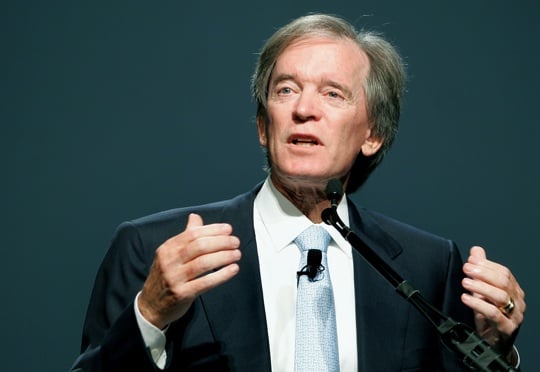With developed nation recession 'possible,' Pimco bond king is spreading his wings
The global economic crisis is leading to a possible “developed economy” recession in the U.S. and Europe, which may be hard to alleviate, according to Pacific Investment Management Co.'s Bill Gross.
In this environment, the world's biggest manager of bond funds favors investing in Australia, Mexico, Brazil and Canada, along with non-dollar currencies that have strong ties to the Asian continent, Gross, co-chief investment officer and founder of Pimco, reiterated. Although global equities are attractive because dividend yields in many cases are higher than bonds, they're vulnerable to faltering growth, Gross wrote in a monthly investment commentary published on Pimco's website today.
Strife between rich and poor in the U.S. is sending Treasury yields lower, Gross wrote. The 10-year yield at 2.25 percent is “discounting a heap of trouble, and neither investor nor borrower may emerge from this brouhaha unscathed,” wrote Gross, who along with co-chief investment officer Mohamed El- Erian coined the term “new normal” more than two years ago to describe a possible long period of below average growth and high unemployment for the U.S. economy.
“We prefer the ‘cleaner' dirty shirt countries of Canada, Australia, Mexico and Brazil, where higher yields and more pristine balance sheets prevail,” Gross wrote.
European Crisis
Gross boosted the $245 billion Total Return Fund's investment of Treasuries to 10 percent of assets in July from 8 percent in June, the Newport Beach, California-based firm said on its website earlier this month. Gross cut cash equivalents and money-market securities in the world's largest bond fund to 15 percent from 29 percent, making it the lowest level in the fund's cash holdings since January.
The crisis in Europe has the most “immediacy” because one or more members such as Ireland, Portugal or Greece may be forced to leave the euro, causing liquidity concerns that would destabilize other regional bond markets unless the European Central Bank stepped in to buy more securities, Gross wrote.
European confidence in the economic outlook in August plunged the most since December 2008 as a persistent debt crisis roiled markets and clouded growth prospects across the 17-nation euro region. An index of executive and consumer sentiment in the single-currency region fell to 98.3 from a revised 103 in July, the European Commission in Brussels said today. That's the lowest since May 2010.
Slower Growth
The ECB began buying Spanish and Italian government bonds on Aug. 8 to stop the debt crisis from spreading to the euro- region's third- and fourth-biggest economies.
ECB President Jean-Claude Trichet said yesterday that the Frankfurt-based central bank is reviewing its assessment of inflation risks on slower growth in the euro area. The region's growth slowed to 0.2 percent in the second quarter, its worst showing since emerging from recession in 2009.
The U.S. economy expanded less than previously estimated in the second quarter, underscoring the weakness that has prompted the Federal Reserve to mark down its growth forecasts.
Gross domestic product climbed at a 1 percent annual rate from April through June, down from a 1.3 percent prior estimate, revised Commerce Department figures showed Aug. 26.
--Bloomberg News--







